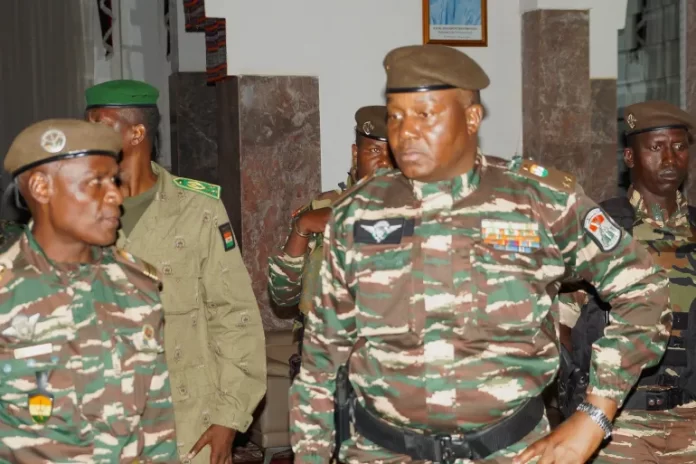It is bad news for Africa. Democracy is once again on the run from the gun. Military adventurers have shot their way into power in six sub-Saharan African countries in three years, between 2020 and 2023. Mali (2020), Chad (2021), Guinea (2021), Burkina Faso (2022), Sudan (2021) and the latest, Niger, a couple of weeks ago as of this writing, changed agbada for khaki.
Five of these countries are in the Sahel region made up of nine countries, including Nigeria. The five countries are among the poorest in the world. No matter how poor an African country might be, it offers its leaders vast opportunities to bury their conscience in the sands of pretentious leadership and corruptly live off the little the country has to offer and corruptly impoverish it.
The lure of corruption is a strong pull on the continent. Power, acquired through the ballot box or the barrel of the gun, remains the shortest route to personal fortunes and wealth on the continent. Democracy be damned. Few men, if any, who saw that route ignored it and chose to live in the penury of missed opportunities.
To think that we have not seen the last of military adventurers on the continent should worry the continent and its people beyond losing sleep at night. It is bad news for Africa, which for much of its life as a colonial outpost, has suffered and suffers from the ravages of external and internal imperialism. It is worse news for democracy because the retreat of democracy in obedience to the dictates of the gun denies the people the right to choose and institute governments of their choice, however flawed the conduct of elections might be. Democracy cannot take root, let alone grow, when it is frequently interrupted by ambitious military men whose gun casts menacing shadow on the continent.
The regress to dictatorship anywhere on the continent is a regress to dictatorship everywhere on the continent. Seventy-one years ago, on July 23, 1952, the late Col Gamal Abdel Nasser and the Free Officers Movement in Egypt began the process that would eventually spread like an unruly cancer to the rest of Africa when they overthrew King Farouk.
On June 18, 1953, Egypt ceased to be a Monarchy and was declared a Republic with Major-General Muhammad Naguib as the first President and Prime Minister of the Republic. Nasser was appointed deputy premier and minister of the interior. He was the king maker and eventually became prime minister and chairman of the Revolutionary Command Council in 1954 and moved up two years later as president in 1956.
He put off his uniform. But he and his fellow officers had told African soldiers what was possible with the barrel of the gun. They proved a bad example for the military in other African countries, beginning with the coup against President Sylvanus Olympio by Col Gnassingbe Eyadema on January 13, 1963.
Many other African countries, including Nigeria, soon cottoned on to it and the sound of the boot crushing democracy and the shrill cry of a weeping democracy could be heard down the length and breadth of the continent.
Charges against the civilian regimes followed what became a well-oiled template parroted by the gunmen each time they lock out democracy in a particular country.
Corruption and poor governance are the first items on the template. They are the common afflictions among African leaders, past and present. The new men in Niger resorted to the same template and told the world they sacked the democratically elected government of President Mohamed Bazoum because it failed to meet the expectations of the people.
The history of military rule in Africa tells a wretched story of the capacity of the military to rise above the venality and the plutocracy. Their history has consistently failed to prove that the uniform turned the military rulers into poster children for good governance and incorruptibility. They too were felled by the same affliction they used as excuses to impose their will on the people with the ever-present gun.
Then as now, the civilian leaders felt helpless. They could not fight back because they needed no one to tell them it was suicidal for them to take on the armed military men. More importantly, they took a do-noting refuge under the OAU charter that barred member nations from interfering in the affairs of fellow member nations. The clause increased the impotence of African leaders in taking such steps as might be necessary to help one another.
I have not read the charter of the African Union (AU), the successor continental body to the OAU, but it appears it has eliminated that charter. Still, AU and the African leaders confine themselves to merely condemning the military adventurers in Mali, Burkina Faso, Guinea, Chad and now Niger. Such verbal canes across the back of the military men are easily absorbed by their uniform.
AU and ECOWAS have given the Niger miliary leaders 14- and seven-day ultimatum respectively to retreat into their barracks and return Bazoum to power.
The Nigerien strong men know only too well that the African leaders are following the convention to bark and that when the push comes to shove, they cannot bite. Neither AU nor ECOWAS has a standing army to take on the the junta. The defence chiefs of the rest of ECOWAS said they were getting ready to take them on. They should have established a reputation of intolerance to military rule since 2020 when the Malian soldiers sacked the elected government in that country.
A military option should not be embarked upon lightly. All the options must be weighed to ensure that such action does not create more complicated problems than we have in the sub-region. This is as delicate as they come. Even if they can raise an army to be deployed to Niger, the African leaders would do better than think twice before taking them on.
Nigeria has a long border with Niger. At least five states share borders with that country. A military operation will create enormous human and resource problems for our country with refugees seeking accommodation and protection here. Such a large number of refugees added to the thousands of internally displaced persons barely surviving in camps will buck the system.
No one should under-estimate the dilemma that African leaders face over Niger. If they get rid of the military there, the military rulers in Mali, Burkina Faso, Guinea, Chad, and Sudan will not return to the barracks out of fright. African soldiers believe they have supervisory authorities over civilian regimes in every African country. They believe their right to truncate democracy is a duty imposed on them by their uniform. It is not.
Since no constitution in any African country recognises the assumed right of the military men to be judge and jury on the performance of a civilian regime, the gun confers faux legitimacy on military rule. A uniform is made of a piece of khaki cloth. The logic of military intervention that the uniform worn by one set of Africans makes them more competent, more patriotic, or less corrupt than the same Africans in agbada is patently flawed. Sadly, we have swallowed its hollowness and fed on military propaganda through the long cold days of military dictatorship in many African countries, including ours. It is, as Malcom X once said, always the ballot or the bullet.
There is a moral dilemma here too. Nearly all the countries in the West African sub-region were at one time or another ruled by the military. The Nigerien military men may scoff at the moral sermon by the ECOWAS leaders who tell them that military rule in their country is wrong but was right in the immediate past of these countries and in the six countries where the khaki, not the agbada, holds sway.
ECOWAS leaders must think of a more creative approach to the menace of military intervention in the sub-region. Democracy under the shadow of the gun is democracy threatened by the gun. Perhaps, they need to revisit the diarchy prescription by the late Dr Nnamdi Azikiwe.
More importantly, African leaders must strive to govern well and respect the rule of law and act in accordance with best practices in the democratic ethos. They must change their style of leadership by their conspicuous indulgence in corruption and open theft of the commonwealth of the people, their egregious disdain for the rule of law and their sense of justice and fairness entangled in their vanity and venality as well religious and ethnic biases.
These may not necessarily be antidotes against military intervention because ambitious military men will find excuses to resort to the gun, but they would be a step forward. The people will support their civilian leaders if they are not denied their rights, justly and fairly treated by their civilian leaders. If they are not hungry and thus induced by their circumstances to pour out to the streets in praise of the soldiers, they may rise and confront the armed military men with clubs and stones and chase them out.



